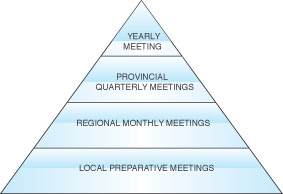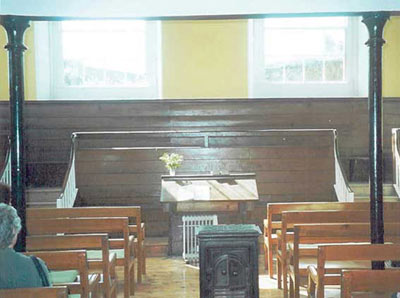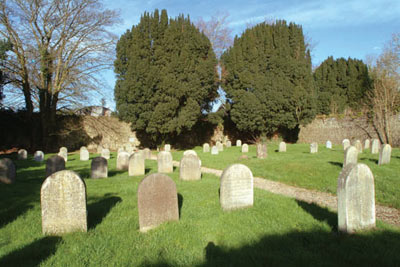
The Religious Society of Friends (Quakers) in Ireland
Organisational Structures

Friends' Organisational Structure
Each local congregation normally also has a "Preparative Meeting" to deal with church affairs. These are grouped into regional Monthly Meetings, at which much of the administrational work of the Society is decided. This includes dealing with applications for membership, decisions about premises, recording births, marriages and deaths etc. Monthly Meetings are grouped into Quarterly Meetings, one each for Ulster, Leinster and Munster, and these in turn are grouped into the Yearly Meeting, which deals with matters affecting Friends throughout Ireland.
Every Member has the right to attend, speak and help make decisions at any of these meetings. Each meeting has a Clerk (or chairman) whose duty is to discern the "feeling of the meeting" (no votes are ever taken) and to record it. All decisions are minuted there and then and the minute is agreed before the next item of business is taken. The Clerk's job is to do the will of the meeting. It follows that decisions come up from the congregation, and are not handed down from the top. The Society is thus not authoritarian, but truly democratic.
In 1662 Edward Burrough said "proceed in the wisdom of God, not deciding affairs by the greater vote, not in the way of the world by hot contests [between] two sides violently striving for dominion."
The following article by Rosemary Hartill in The Friend of 18th March 2005 is very helpful in explaining the Quaker method of reaching decisions in our Meetings for Church Affairs, which we call our Business Meetings. It points out the difference between "consensus" and "the sense of the meeting". The title of the article was Governing by consensus:
From now on, the World Council of Churches is to make most of its decisions by consensus.
The move comes in response to the eastern Orthodox churches, who have often felt alienated by a voting system that seemed to favour a western Protestant perspective.
In Geneva it is being said that the change was influenced partly by Aboriginal processes, and partly by Friends who "have a long tradition of using consensus decision-making". In fact of course we have something much more interesting.
The best summary I have read of sense of the meeting is Barry Morley's Pendle Hill pamphlet (307) called "Beyond Consensus". Mere consensus, he says, is achieved through a process of reasoning in which reasonable people search for a satisfactory decision. It is a secular process, the product of wilfulness, in which we will ourselves to a decision.
In "sense of the Meeting", the Spirit gets a voice. It is a product not of will, but of willingness in which we allow ourselves to be led.
He identifies three stages of what happens in a gathered business Meeting. The first is "Release", where, in a safe place among listening friends, we express our feelings about the subject.
The second is "Long Focus". With this, we gradually come to see things in a wider perspective. It's a bit like a great painting: it has a quality of timelessness.
The final stage is "Transition to Light". In this, we slip beyond issues and answers to reach, if only momentarily, that place beyond time where we taste tranquillity. We allow ourselves to be led to a transcendent place of unmistakable harmony, peace and tender love.
The other day, a Friend told me of the first business Meeting she ever attended. Exactly that happened. It's one of the reasons why, years on, she's still a member today. Without it, she might never have returned.

Edenderry Meeting, Co. Offaly
We have a minimum of rules laid down for church government. They fit comfortably into a slim 100 page volume entitled "Organisation and Christian Discipline".
"Elders" are appointed to look after the spiritual welfare of Friends, and "Overseers" to provide pastoral care. As we have no paid ministers, much of the work of the Society is dealt with by Friends themselves.
In Ireland there are 29 local, 7 Monthly, 3 Quarterly Meetings and 1 Yearly Meeting. On any Sunday attendance at Meetings for Worship throughout Ireland totals about 600.

A Friends' Burial Ground.
(For list of Meetings for Worship throughout Ireland see elsewhere)